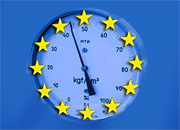The potential consequences on the EU's energy future are serious, as 80 percent of Russian natural gas exports to Europe transit through Ukrainian territory. The country has been in repeated price disputes with the Russian state-owned gas monopoly, Gazprom, resulting in interruptions of deliveries to the Ukrainian market in January 2006 and 2009, with supplies to Europe affected both times. Mediation on the part of the EU and Western European governments prevented such episodes from deteriorating on other occasions, most notably in January 2010. Hence, it stands to reason that a reorientation in Ukraine's politics would trigger a parallel reorientation in European energy policies.
A first sign of the direction the new European strategy will take might have come on March 4, when the EU assigned funding to priority projects in the gas and electricity sectors. The largest appropriation, €200 million, went to the Nabucco pipeline, whose declared objectives have always been the creation of ties with the Caucasus and Central Asia, and the reduction of European dependence on Russian gas. Although not huge in monetary terms, this measure is particularly relevant since the EU imprimatur may finally convince investors that the pipeline will be built and that they can safely pour their money into the venture.
However, the difficulties of the Nabucco consortium in finding upstream supplies led some high-profile European officials to foreshadow a deal with Gazprom to fill the pipeline. Meanwhile, the governments of Germany, Italy and (less overtly) France actively support Nord Stream and South Stream -- both projects that would bypass Ukraine but would actually increase Europe's dependence on Russian supplies. Finally, given the continuous delays plaguing Nabucco, as well as recent tensions between Turkey and Azerbaijan, some observers increasingly see White Stream -- a trans-Black Sea pipeline projected to run directly from Azerbaijan to Romania, and then on to Ukraine for transit -- as an alternate solution, although it has yet to receive official backing.
These contradictory positions by European countries and EU institutions reflect not only their notoriously fragmented decision-making. They are, more significantly, a consequence of widespread uncertainty about the lens through which recent relations between Moscow and Kiev should be viewed. There are in fact two competing narratives of the so-called "gas crises," with each of them informing different energy security strategies.
According to the version dominant within the European Commission, the ever-higher prices Gazprom charged Ukraine at the expiration of each annual supply contract represented official Kremlin policy aimed at punishing Ukraine for having left Russia's sphere of influence. For those who embrace this interpretation, the election of the more-accommodating Yanukovych will increase the Ukraine's reliability as a transit country and make it a safer place to invest, thus favoring White Stream over Nabucco, while simultaneously eliminating Moscow's need for the new Russian pipelines.
But a competing narrative is gaining popularity in some Western European capitals and among energy company executives. This one depicts Ukraine as a country unable to pay its bills due to its highly inefficient networks, its low levels of investment in the face of obsolete Soviet infrastructures, and its management practices riddled with incompetence, excessive bureaucratization and cronyism. In this view, Gazprom's actions were understandable for a multinational company that, facing tough competition on the global oil and gas markets, legitimately wants to end post-Soviet subsidization of satellite countries and sell to Ukraine at market rate. Indeed, even after resolving the pricing disputes, Kiev still pays 20 percent less for its gas than Western European countries.
If Ukraine really is to blame, prospects for the years ahead do not look so rosy and would suggest the need for rapid alternatives, regardless of the origin of the gas. In fact, Yanukovych is very much tied to the power elites that traditionally run the country's energy sector, and he is unlikely to risk his political capital to undertake a painful restructuring -- especially if he believes that his proximity to the Kremlin can earn him more benign treatment from Gazprom. After all, the departing "Orange" administration encountered huge difficulties when it tried to bring the country's energy sector into conformity with European norms and standards.
As always, the truth is somewhere in the middle. The approach of outgoing President Viktor Yushchenko clearly failed, and the need for a softer stance toward Moscow became clear once the possibility of NATO and EU membership for Ukraine -- and along with them Western institutional protections to counter Russian influence -- faded. Even former Prime Minister Yulia Tymoshenko -- Yushchenko's hard-line partner during the Orange Revolution and Yanukovych's opponent in the presidential election -- acknowledged the need for greater cooperation with Gazprom. She even sealed a deal with the company in the months before the election to prove her competencies in the energy business and her credentials as a negotiator with Moscow.
At the same time, the Ukrainian energy sector's poor governance is a real issue, and the coming five years of Yanukovych's administration are likely to be characterized by incidents, disputes on payments, and requests for foreign help and funds.
Unfortunately, Europe cannot have the best of both worlds, and might end up with the worst, should its current state of indecision allow a strategic policy area to be decided by random events and actors external to Europe and its institutions. Individual European countries cannot effectively guarantee their own energy security, especially in light of the progressive formation of a common European market for electricity and gas: Fragmentation and long-lasting rivalries between projects are too expensive, inefficient and time-consuming. Europe needs to negotiate a single position and orient its external policies accordingly. Although the newly enforced Lisbon Treaty provides few tools to directly catalyze integration in this area, renewed efforts to unify the still-fragmented national energy markets may lead to a gradual convergence of preferences.
"World Politics Review"
01 Марта 2026 | воскресенье | 04:22


